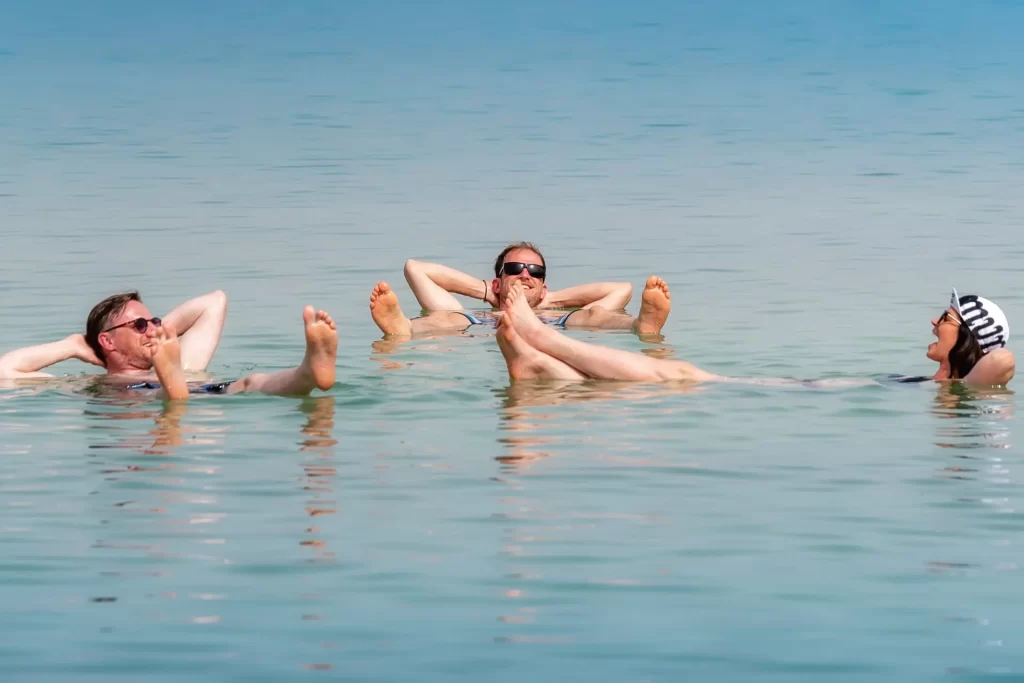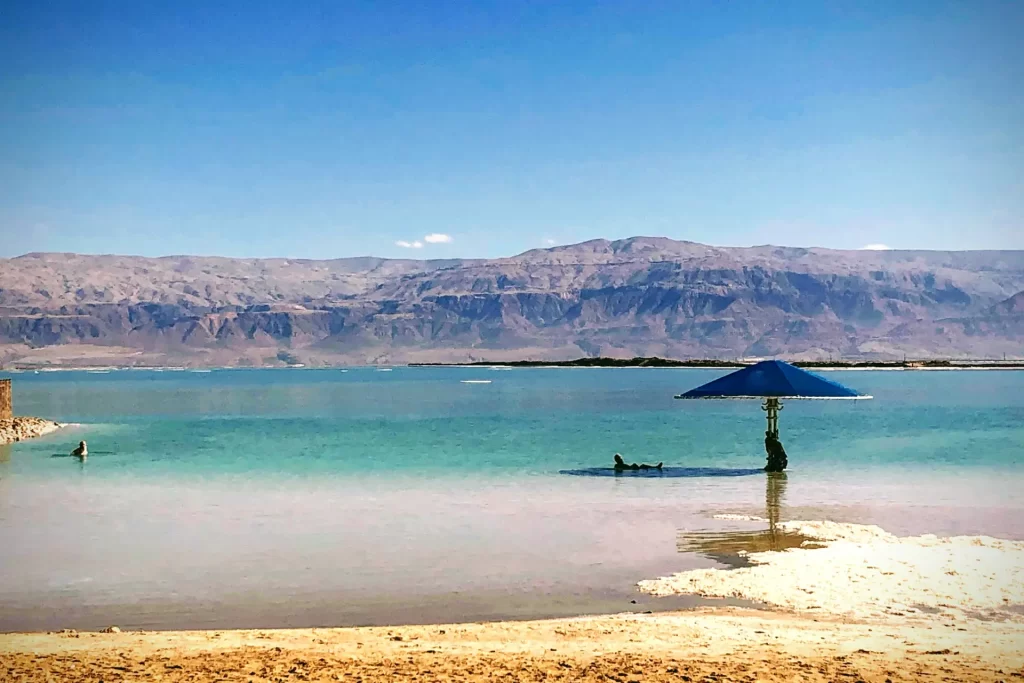Dead Sea floating: fun unique buoyancy
It’s one of the most unusual experiences of the Dead Sea floating. It offers fun, is free, and is accessible from anywhere! A must-do item on your list is to float in the Dead Sea! Take a seat, unwind, and take in this act of nature. The Dead Sea’s unique buoyancy allows individuals to float effortlessly because of its exceptionally high percentage of salt. Your schedule likely includes visiting the Dead Sea if you’re considering a vacation to Israel.
For various reasons, the salty lake between Israel and Jordan is popular with travelers. You may think the Dead Sea is a magical phenomenon, whether you want to try the natural mud’s medicinal powers or float on its lovely blue waves. Still, the science behind it is far more fascinating to see. The Dead Sea’s high concentration of mineral salt is the key to this peculiar phenomenon. The Dead Sea’s salinity—around 31.5%—is about ten times higher than a normal ocean’s.
What is the sensation of buoyancy in the Dead Sea?
You feel as though your legs and feet are being pushed up as soon as you put them in the water, and as you go deeper, you can feel your body becoming lighter and more floating. Recline and let your body drift into the Dead Sea. It is a soothing experience that lets your body rest and relieves tension. All you can do is unwind and float in the Dead Sea. You should bring a book or newspaper, unwind, and enjoy yourself—you can’t swim or dive due to the buoyancy and salt.
You float on the Dead Sea, but why?
More salt is present in the Dead Sea than in any other body of water. The salt content is 34%. The water is thicker than typical fresh water because of the exceptionally high concentration of dissolved mineral salts. Our bodies are more buoyant in the Dead Sea because we are lighter (less dense) than the water, which makes floating easier. Floating in the Dead Sea is simple due to its extremely dense water, so it is challenging to stand upright. We begin to feel buoyant in the ocean and float a little.
Ideas for Dead Sea Navigation
Avoid submerging yourself in the water, soaking your head or face, or going near the water if you have open wounds. Also, avoid shaving or waxing on the same day. Please be aware that the text above is only a suggestion. Bathing is advised only on designated Dead Sea beaches and when lifeguards are on duty.
The ideal time to go to the Dead Sea
Whether you are planning a trip now or later, floating in the Dead Sea will undoubtedly enhance your enjoyment. Many people visit this location all year long, and the weather is typically perfect for it as well.
Naturally, it is too hot to go into the water in July and August during the summer; thus, many people choose not to visit the Dead Sea during these months. Although it may seem chilly in the winter, the water isn’t frozen, and you may still get into the sea.

Different reasons for the Dead Sea floating
Fall at the Dead Sea: September through November is the ideal time of year to visit the Dead Sea. Since Sukkot, Yom Kippur, and Rosh Hashanah fall during this period in Israel, many people visit the Israeli side of the Dead Sea to participate in the celebrations and other events.
Until the end of October, the weather was perfect for floating in the Dead Sea; the temperature started to drop. However, November is still a good month to arrange a trip to the Dead Sea because it is still not too chilly.
The wintertime Dead Sea: December through February are considered the winter season. Even though the weather starts to drop in November, many travelers worldwide still choose winter travel.
The Dead Sea appears to be a wonderful vacation destination for people who long for warmer weather during these months when snowfall falls in many areas of the planet.
Dead Sea in the springtime: Springtime lasts from March to May. The temperature is pleasant, there is little risk of rain, and lodging costs are lower than in the fall. Therefore, the ideal times to visit the Dead Sea are in March, April, and May.
The summertime Dead Sea: Summer lasts from June through August. This time of year brings humid weather and intense daytime heat that may make your Dead Sea floating experience uncomfortable. As with any other body of water, you should always use caution when floating in the Dead Sea. Kids should never be left unattended in the water; adults should constantly watch over them. Amazing floating experiences, however, are just one aspect of what the Dead Sea has to offer. Elevated salinity is correlated with an extraordinary mineral composition, utilized extensively in the cosmetic and aesthetic sectors, and proven to facilitate a range of skin ailments. The Dead Sea region is a globally recognized spa destination you must include on your bucket list because of its wonderful natural attributes and opulent hotels along its beach!
The best resorts around the Dead Sea
There are many Dead Sea hotels to pick from, ranging from opulent resorts to affordable lodging. The neighboring communities provide various lodging options to meet everyone’s budget and cater to single and family travelers.
Marriott Resort & Spa at the Dead Sea
Regarding a peaceful getaway, the beachside resort and spa close to the Dead Sea has it all. The Dead Sea Marriott will provide excellent service with five pools and two restaurants. Additionally, you may go floating in the Dead Sea whenever you like because it’s only a few minutes away.
Dead Sea Kempinski Hotel Ishtar
This five-star hotel next to the Dead Sea is well-known for its exclusive beach area and spa, which offer sea salt and mud treatments. Having amenities like family rooms and an airport shuttle guarantees beachgoers a relaxing holiday. In addition to these two, consider Crowne Plaza Jordan, David Dead Sea Resort and Spa, Israel, and Movenpick Resort & Spa, Dead Sea.
Traveling to locations like the Dead Sea is enjoyable. So get ready with your backpack for men, and staying at these resorts and hotels adds to the excitement.

The Dead Sea Visit: Dos and Don’ts
Here are some dos and don’ts when visiting the Dead Sea.
Try the mud.
What is acne? Dead flesh? Want only the opulent skin treatment’s advantages? Make sure to lather your skin with some natural mud after floating in the Dead Sea for a while. Use the shower to wash off the mud after covering your entire body and face; avoid getting seawater on your face. And presto—gorgeous, silky skin!
Healing up any wounds.
Even though the Dead Sea’s salt helps hasten the healing of open wounds or sores, the sea’s scorching heat is not something you want to feel when attempting to unwind and float. Apply a bandage over any cuts you may have beforehand for easier floating.
Don’t
Shaving right before
It will make your skin itchy after shaving or waxing. The sensation will be painful, stinging, or burning, like open wounds or sores. Avoid shaving a day or two before your excursion to the Dead Sea.
Drop your head.
The salty waters of the Dead Sea may burn your eyes badly, unlike when you stick your head under the water in a pool or even the ocean. Additionally, it is not recommended since the water’s density can cause your head to drop. When you must wash your face, go to the showers; save the Dead Sea for floating.


